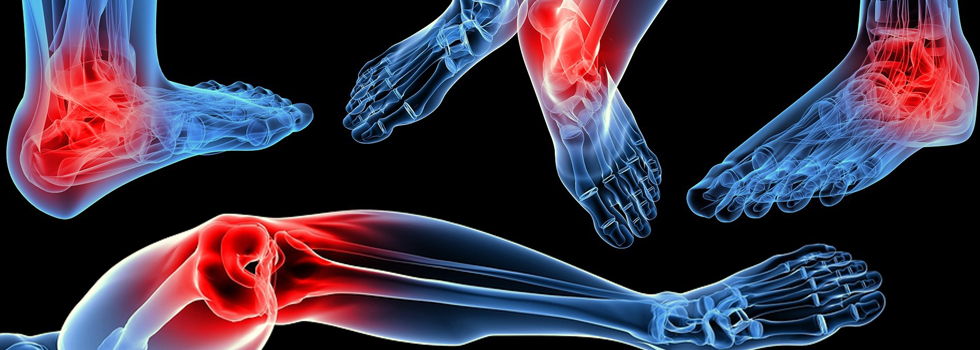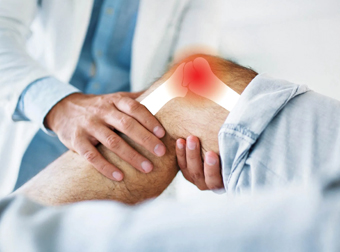Joints Pain & Arthritis

Joint pain is a common problem most people would experience. It may be a pain in the knee, hip, or spine. When joint pain is chronic, then it becomes a serious problem. Joint pain can occur due to wear and tear of the cartilages. It may occur due to injury or could be the result of a disease like arthritis. Whatever be the reason, joint pain can be debilitating. It can affect normal routines and make things difficult for the sufferer. While conventional medicines may provide immediate relief, they have side effects that are a concern. Ayurveda helps to offer safe and natural management for joint pain.
Joint Pain and Ayurveda
According to Ayurveda, joint pain occurs due to the imbalance in the functional energy or Dosha in the body, known as Vata. This energy is responsible for movement and spaces, which corresponds to the space between the joints. An imbalance in a form of Vata known as Vyanavata can cause circulation problems. As a result, the tissues fail to get nourishment. This leads to wear and tear in the joints causing severe pain. One more form of energy is the Shleshaka Kapha. This helps keep the joints lubricated allowing for smooth movement.
Imbalance in the Doshas causes the weakening of the digestive fire. This causes the accumulation of toxins. The toxins are carried to the joints by Vata and they cause pain. The Shleshaka Kapha gets dried up due to the presence of toxins. This affects the lubrication in the joints causing pain. Ayurveda believes that to help manage joint pain, helping to maintain the Dosha is necessary. This can be done through the help of therapies, helping to make dietary and lifestyle changes, and using Ayurvedic herbal supplements.
Types of Arthritis / Joint Pain
Ankylosing Spondylitis is arthritis that affects the spine. It often involves redness, heat, swelling, and pain in the spine or in the joint where the bottom of the spine joins the pelvic bone.
Virechanam (purgation) - induced purgation clears the lower gastro from the duodenum (end of stomach) till the exit.
Gout is caused by crystals that build up in the joints. It usually affects the big toe, but many other joints may be affected.
Juvenile Arthritis is the term used to describe arthritis in children. Arthritis is caused by inflammation of the joints.
Osteoarthritis usually comes with age and most often affects the fingers, knees, and hips. Sometimes osteoarthritis follows a joint injury. For example, you might have badly injured your knee when young and develop arthritis in your knee joint years later.
Psoriatic Arthritis can occur in people who have psoriasis (scaly red and white skin patches). It affects the skin, joints, and areas where tissues attach to bone.
Reactive Arthritis is pain or swelling in a joint that is caused by an infection in your body. You may also have red, swollen eyes and a swollen urinary tract.
Rheumatoid arthritis happens when the body’s own defense system doesn’t work properly. It affects joints and bones (often of the hands and feet), and may also affect internal organs and systems. You may feel sick or tired, and you may have a fever.
Goals of treatment of Arthritis at Ganesh Holistic Wellness Clinic
- Use of analgesics/ pain killing allopath drugs cannot be a solution in long term management.
- Relieving a joint pain is a short term therapy. It doesn’t necessarily mean a complete cure of arthritis.
There are some other goals to achieve in long term management of Arthritis. They are as follows:
- Relieve symptoms.
- Stop inflammation or reduce it to the lowest possible level (put disease in remission).
- Prevent or treat obesity.
- Prevent joint/ tissue damage.
- Improve functions of joints and overall well-being.
- Reduce long-term complications especially with the help of Panchakarma.
At Ganesh holistic wellness clinic, we prefer Ayurvedic therapies such as Virechan, Abhyanga, Basti, and Upanaham offer cure for Arthritis by correcting the digestion process and metabolism. These treatments involve medicated oils to lubricate the joints and strengthen the muscles/ ligaments around them along with graded exercise or Yoga. Moreover, the Ayurvedic oral medications such as Guggul and Sallaki work in combination with various other Ayurvedic drugs. These therapies provide positive results and improve the quality of life of the affected individual.

Symptoms of Arthritis/Joint Pain
- Pain, redness, heat, and swelling in your joints
- Trouble moving around
- Swelling of joints
- Weight loss
- Joint deformity
- Rash or itch